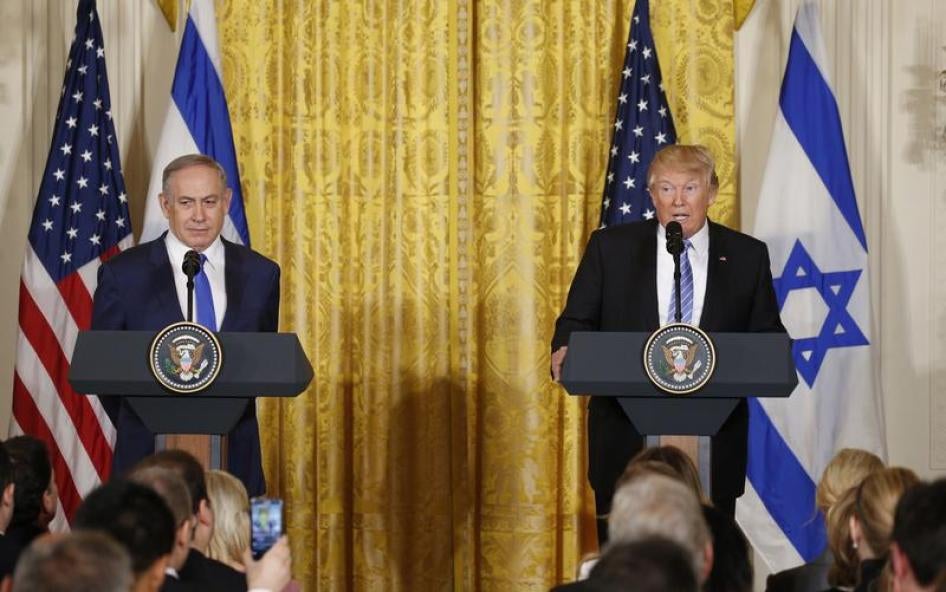U.S. President Donald Trump says he won’t insist on a two-state solution to the Israeli-Palestinian conflict. The shake-up that announcement has caused to the diplomatic community in the U.S., Europe, and the Middle East could be just what the Israeli-Palestinian conflict needs.
For decades, U.S. government’s obsession with a two-state solution has provided cover for its failure to address Israel’s human rights abuses in the West Bank and Gaza, which have stunted Palestinian economic development and harmed the dignity and autonomy of 5 million people living under Israeli occupation.
Since the collapse of the Oslo peace process and the outbreak of the second intifada against Israel in 2000, successive U.S. administrations have made dividing Israelis and Palestinians into two separate states a cornerstone of their Middle East policy. In 2003, the George W. Bush administration announced a plan to achieve a two-state solution within two years. In 2013, Secretary of State John Kerry decided he needed just a year to secure a peace deal. In the interim, U.S. mediators logged thousands of flight hours trying to revive direct negotiations, despite the obvious gaps between the positions of the two sides and the power dynamic between the occupier and occupied.
The pursuit of the holy grail of a two-state solution appeared to have blinded American negotiators to disturbing developments on the ground. U.S. administrations have opposed settlements as “obstacles to peace” because they interfered with the goal of separating Israelis from Palestinians. Not because settlements constitute a war crime under international humanitarian law. Not because they are established on land unlawfully seized from Palestinians. Not because their existence—and the desire to defend and expand them—wreaks havoc with Palestinians’ lives. To defend the settlements, the Israeli army blocks travel between Palestinian towns, destroys nearby Palestinian homes and businesses, and renders off-limits valuable Palestinian agricultural land. The Israeli authorities also disproportionately allocate to Israelis natural resources extracted from Palestinian lands, such as water and valuable stone and marble that belong to the Palestinians.
Yet the U.S. has consistently opposed international measures of accountability for abuses caused by settlements, including actions by the International Criminal Court, with the explanation that “unilateral” Palestinian attempts to achieve justice interfered with real or imagined negotiations. After all, Israeli negotiators assured the U.S. that two-thirds of Israeli settlers live in large settlement blocs that could easily be annexed to Israel, preserving the viability of the two-state solution.
U.S. diplomatic activity has taken up space, discouraging European Union diplomats from adopting a more rules-based approach to violations of international law and eclipsing efforts to remedy abuses on the ground. European diplomats, whose foreign policy was also premised on direct negotiations leading to two states, deferred to American leadership.
Indeed, since President Bill Clinton first officially embraced a two-state solution in January 2001, the settlement population has nearly doubled to 560,000 people, fueling increasingly harsh Israeli restrictions on Palestinian movement and economic development. The World Bank estimates that restrictions on Palestinians in Area C alone, which constitutes 60 percent of the West Bank territory including Israeli settlements, cost the Palestinian economy $3.4 billion annually, which is about a third of Palestinian GDP. Gaza has been closed for the past 10 years, further stifling West Bank’s economic growth and thwarting opportunities for its residents, 54 percent of whom are children and teenagers.
One should have no illusions that the new U.S. administration will pay more attention to the human rights of Palestinians than its predecessors. Trump’s record on standing up for human rights is poor, and his actions in office have done little so far to distance his presidency from a campaign that was marked by misogyny, racism, and xenophobia. His choice of an ambassador to Israel and a Middle East envoy who support Israeli settlements in the West Bank does not bode well for a rights-based approach. But perhaps the rift that Trump so casually created last week between U.S. Middle Eastern policy and that of many European and Arab countries will create space for new diplomatic and civil society initiatives, including from Europe and the Middle East, that focus more on what is happening on the ground than on a speculative “peace process” that has ignored such developments.
Since 2001, American leadership on the Israeli-Palestinian conflict has been single-minded, robust, and utterly ineffective in either achieving peace or protecting people’s rights. In order to protect the economic, social, institutional, and familial ties that exist throughout historical Palestine or the biblical Land of Israel, it’s time for a more de-centralized approach, including international jurisdiction for serious crimes, economic pressure on businesses supporting settlements, and diplomatic initiatives that recognize the need for freedom of movement.
The reality is that, between the Jordan River and the Mediterranean Sea, there are about 6.5 million Jews and 6.5 million Palestinians living together. But the Palestinians in the occupied territory are living under worsening conditions of occupation, oppression, and inequality, and both sides suffer from trauma and insecurity. Both a one-state solution and partition into two independent states could be compatible with respect for their rights. But however many states are created, diplomatic interventions—by the U.S. or by others who may fill a leadership gap—should focus on dignity, justice, and respect for the human rights of those on the receiving end of any peace initiative.








